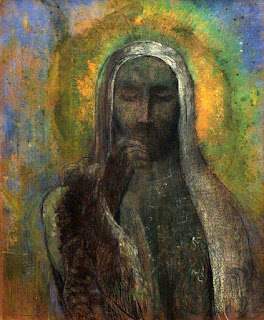‘The silence of eternity, interpreted by love’: the Passion, the silent Christ, and our salvation
At the Parish Eucharist, Palm Sunday 2024
Mark 15:5
“But Jesus made no further reply, so that Pilate was amazed.”
That was a long Gospel reading.
Last Sunday’s Gospel reading for the feast of Saint Patrick had a mere 143 words. Today’s Gospel reading has 883 words, six times as long, a full chapter from Saint Mark’s Gospel [1].
And so Holy Week begins. It is a week traditionally marked by much longer readings from the Scriptures.
We also have additional ceremonies that take place in our services in Holy Week. Today, as we have seen, we have had the blessing of palms. On Maundy Thursday evening, with our parish church darkened, the altar is solemnly stripped ahead of Good Friday.
Each day is marked by services and special readings from the Scriptures.
There are many deeply evocative hymns for Holy Week, which we are singing today and will be singing throughout this week.
Across the Christian traditions, our services also tend to be longer. For example, the Good Friday liturgy in our parish church lasts from midday to 3pm. Now, yes, you are more than welcome to come and go during that time - but the service itself stretches out over three hours.
There are, in other words, many, many words spoken and heard, prayed and sung during Holy Week.
And this is as it should be. For in this week we enter into the saving events at the very heart of the Christian faith, saving events without which Christianity would not exist - the saving events of the death and resurrection of Jesus Christ.
At the centre of all these words, however, is a silence, a silence that stills us, a silence which draws us into the very heart of all things.
“But Jesus made no further reply, so that Pilate was amazed.”
Of the 883 words in our gospel reading, only 12 - 12 - are spoken by Jesus. Two brief, short sentences; one before Pilate, one upon the Cross.
Apart from these few words, Jesus is silent.
And this silence brings us to behold why these events are for us and our salvation.
The reading of the Lord’s Passion on Palm Sunday is a sobering experience. In the characters around the cross - Peter, Judas, all of the Twelve; the religious authorities; Pilate; the crowd; the soldiers - we see our world. We see ourselves.
Painful failures, moral compromises, pride, ambition, cruelty in word and deed, casual injustices, mocking the weak, cynicism.
It’s our world that we see in the story of the Passion; and, uncomfortably, it’s aspects of our own lives that we see there; characters who we recognise as reflections of ourselves.
And what is the response of Jesus to those around him in the Passion? To those in whom we see ourselves?
Are there harsh words of condemnation? Are there promises of retribution with fire and brimstone? Are there loud declarations of coming vengeance? Are there appeals to heaven for crushing judgement against the guilty?
“But Jesus made no further reply, so that Pilate was amazed.”
The silence of Jesus is the silence of gracious, faithful, abiding love - even now; even when surrounded by abysmal, abject failures; even when betrayed, and denied, and rejected; even in the darkest, deepest pit that humanity has dug for itself.
No wonder Pilate was amazed. He was well used to forcefully exercising earthly power; crushing opponents; eliminating enemies; shoving aside the weak; ruthlessly exploiting the failures of others.
Standing before him, however, is the One who is radically different. The One whose silence overturns all pretensions and delusions, all pride and self-righteousness.
The One whose silence speaks forgiveness, grace, and mercy to our broken, confused world.
The One whose silence lovingly abides with us, in our failures and shames, our weaknesses and foolishness.
“But Jesus made no further reply, so that Pilate was amazed.”
The much loved, quietly beautiful hymn ‘Dear Lord and Father of Mankind’ has a line which we can use to describe this silence of Jesus during the Passion: ‘the silence of eternity, interpreted by love’ [2].
This is what we behold at the heart of the Passion, at the heart of Holy Week: the divine love, even in the very depths of darkness, sin, and death, present, abiding, redeeming.
The gracious, loving silence of Jesus in the Passion, in the midst of betrayal and denial, suffering and death, is our assurance that there is no part of our lives, there are no times in our lives separated from, beyond the reach of, untouched by the love of God in Christ.
Why do we have that long Gospel reading on Palm Sunday, at the beginning of Holy Week? Why do we observe Holy Week? Why is Good Friday solemnly observed by Christians across the world? Why do we say in the Creed that the life, death, and resurrection of Jesus Christ is ‘for us and for our salvation’? Why is the Cross the sign of Christianity?
It is the silence of Jesus during the Passion which draws us to see why all this is so, for it is ‘the silence of eternity, interpreted by love’; the gracious, forgiving divine love, revealed in the Passion of our Lord, at the very heart of the mess, the compromises, the confusions, the failures of our lives, of every life.
So let us enter into Holy Week, stilled in heart, mind, and soul; beholding in faith, hope, and love our salvation, the One whose silence during the Passion reveals God’s abiding love and gracious forgiveness, embracing us and holding us all our days, and unto the life everlasting.
----------
[1] Mark 15:1-47, the alternative provision made in the BCP 2004 lectionary.
[2] Church Hymnal, 549.
The illustration is Odilon Redon's 'Le Christ du Silence', 1890.




Comments
Post a Comment